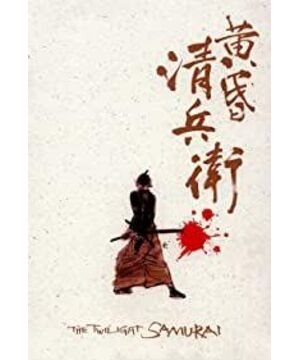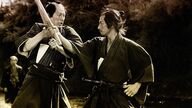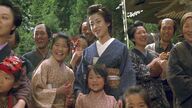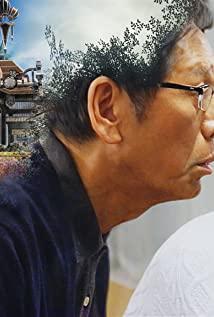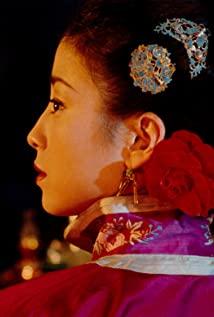One who resides in the world, establishes the right position in the world, and walks the great road of the world; if you have your will and the people, follow the path of your own; if you have no will, you can’t be promiscuous; you can’t move the poor and the lowly, and you can’t be submissive in power: this is called a great man.” - Mencius
Yesterday I watched "Twilight Qingbingwei" again in the evening. I watched it a little later in the middle of the night. After watching it, I couldn't get enough of it. I tossed and turned for a long time before I fell asleep. When you watch it with such concentration and shock, you can see how fascinating this film is.
This film tells not a story, but a person, Iguchi Kiyobei, an ordinary, hard-working person who is as weak as dusk. He is not famous and unremarkable, his life is only remembered by his daughters, in the eyes of her daughters, he is not ordinary and difficult, but great and happy, and in his daughter's story, we I know that Qingbingwei is really great and really happy. Although it is just ordinary greatness and short-term happiness, it is enough.
Qingbingwei is a man with a great personality. He may not be able to meet the standards of Mencius, but he definitely knows what to do and what not to do. Although Qingbingwei was a low-level samurai, he was definitely not pedantic in the samurai class. Many of his ideas were contrary to the ideas of the time. In the era of advocating "a woman's lack of talent is a virtue", he told his daughter: What's the use of reading? Reading can learn the ability to think, master this ability, no matter how the times change, you can survive. In the age of marriage at the behest of his parents, he raised the question: "How can marrying a wife be like buying livestock, and how can I be strong?" During the shogunate era, the samurai was the ruling class, and even the most impoverished samurai were reluctant to give up the honor and dignity of the samurai. But Kiyobei obviously did not take the honor and dignity of the samurai seriously. For his wife's funeral, he sold the saber that symbolized his identity as a samurai. For the expense of the family, he gave up personal pleasures and cleanliness of appearance. His face was obviously untouched for a long time, he was wearing torn clothes, and his body smelled bad because he didn't take a bath, and he got it because he never went to socializing." Dusk Qingbei" nickname. But he obviously didn't care about that. When a friend asked him about his plans in the future, he said that he planned to become a farmer for the rest of his life. The transformation from a ruling class into a commoner is something that any samurai would not tolerate, just like the swordsman Yugo Zenemon who let him fight against, he must restore the glory of the samurai no matter what, but these glory are meaningless to the Qinghei. It is all about the survival of your family.
Although he didn't care about these issues related to the glory of the samurai, but on some other issues he cherished, he strengthened his position and clarified his principles, such as family affection, friendship, love. In terms of family affection, no matter how hard he is, he still has to provide his daughter to go to school, and he does not allow his uncle to insult his mother. Even when he ordered him to fight against the swordsman Yuwu Zenemon, he refused to fight, which is bothering many ancient sages Facing the question of "loyalty and filial piety cannot be both", he chose filial piety without hesitation. In terms of friendship, he has no hesitation to stand up for his friends and stick a knife in both sides. And when Yugo Zenemon challenged himself, he pretended to be cowardly and refused, not caring about the dignity of a samurai at all. In fact, it was he who came forward for his friends, disrupted his peaceful life, and led to the duel later, but because of this duel, he finally opened his heart and got the beautiful Pengjiang, which is really a blessing in disguise , good fortune fools people. Let's talk about his love with Pengjiang. From a very young age, he hoped that Pengjiang, his childhood sweetheart, could become his wife, but his meager salary made him know that he could not make Pengjiang happy, and the complaint of his dead wife strengthened his idea. , There is a noble concept of love that loves her and makes her happy, even if she does not belong to her. Obviously, Qingbingwei belongs to such a noble person. If he keeps his current life, maybe he will regret it for the rest of his life. But the duel changed all that, and he knew he had to speak up or there might never be another chance. And speaking out, if he dies, he will die without regret, if he lives, he will have the ability to make Pengjiang live a happy life. Under the threat of death, he could no longer maintain a calm mood, and he told Pengjiang his deepest love in his heart. Qingbingwei has lived for others all his life, and only when he was "dying" was he selfish.
The Qingbingwei in the film is not perfect, but also a man of flesh and blood. He also hopes for love, hates poverty, and fears death, but he has never thought of using superb martial arts to obtain all of this, and he has never shown these negative emotions in front of friends, family, and lovers. He is always neither humble nor arrogant. , so calm and calm, and these originate from a kind of tolerance unique to the Orientals, from the Confucian spiritual realm of "self-discipline, prudence, self-discipline, and knowledge", which enables him to face life calmly and calmly, and to be able to Facing death calmly and peacefully. Just like the portrait taken by the protagonist of "August Photo Studio" for himself, calm, calm and smiling.
The film is called "Twilight," perhaps referring specifically to the Twilight of the Samurai. The turbulent times are just like Qingbingwei's love. He has been displaced in the river of fate, and we also have mixed joys and sorrows in his story. When he rejected brother Pengjiang's proposal, we were disappointed. When Pengjiang rejected his marriage proposal, we were lost. When he came back alive and finally united with Pengjiang, we were extremely happy. When we thought the story ended with a reunion, which was so short-lived, he was finally strangled in the gears of the times. There is no way to do this. Although he has a clear understanding of the various reactionary and ignorance of Bushido, knowledge does not mean getting rid of it. He still cannot get rid of the shackles of Bushido. A soldier, this kind of ignorance is the limitation of the times, we can only be angry with him, he wants to be free from the world all his life. But he couldn't mourn his misfortune, because he turned out to be happy. At first I thought, as his colleagues said, Seibei of Twilight is really an unlucky man. But his daughter doesn't think so. Her father is happy because he has a deep love for his daughter, his love for the beautiful Pengjiang, and of course his independent and complete personality. Although short, he is happy. Seeing this, I am relieved, as Gu Long said, he has come, lived, loved, and this is enough.
Suddenly I thought of a song "The Hillside Sheep":
Green mountains treat each other, white clouds love each other. I can't dream of the purple robe and the golden belt. A thatched house, wild flowers bloom, who will succeed or fail? A single scoop in a mean alley is also happy. Poor, angry! Da, will not change.
View more about The Twilight Samurai reviews


